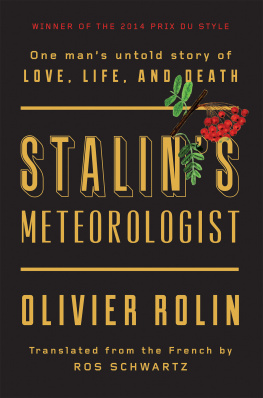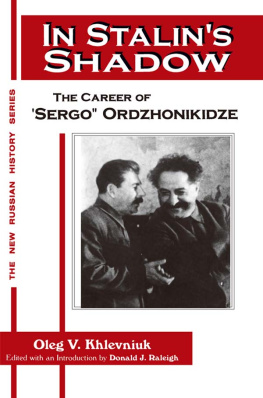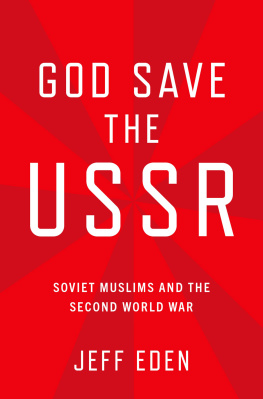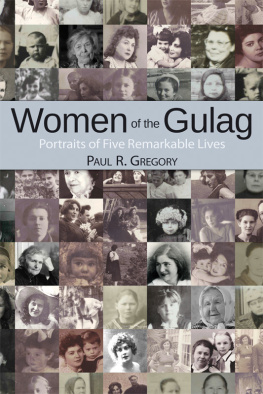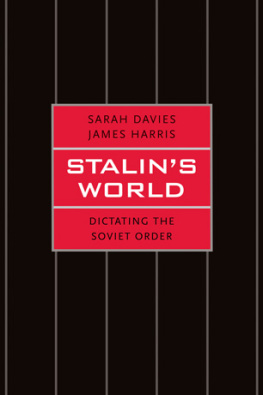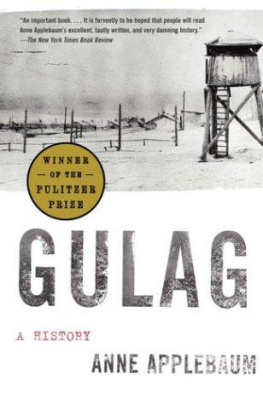

also by olivier rolin in english translation
Hotel Crystal
Paper Tiger

Devise a way
That the eye not shut
And yet the world vanish
Since drowning is inevitable
Never trust the boat
But do
Trust the river.
Kailash Vajpeyi
Trans. from the Hindi by Ananya Vajpeyi
For Masha
And I thought and I read
According to the Bible of the breezes
sergei yesenin , Soil, Soil Soil in The Collected Poems

he was an expert on clouds. The long cirrus ice quills, the swollen, towering cumulonimbi, the torn ragged strati, the stratocumuli that ruffle the sky like wavelets left in the sand by the receding tide, the altostrati that veil the sun, and all the vast, drifting shapes rimmed with light, the fluffy giants that produce rain and snow and lightning. But he didnt have his head in the cloudsor at least I dont think he did. From what I know of him, there is nothing to suggest he was an eccentric. He represented the USSR at the International Commission on Clouds, he spoke at pan-Soviet congresses on the formation of fog, and in 1930 he set up the Weather Bureau. But these lyrical names didnt set him dreaming. As a scientist doing his job in the interestsof courseof building socialism he took it all seriously; he was no comic-strip Professor Nimbus.
Clouds were not his excuse to dream, there was nothing nebulous about him; I suspect him even of a certain starchiness. Appointed the first director of the USSRs Hydrometeorological Centre in 1929, he set out to establish a water registry as well as a wind and a sunshine registry. He probably saw nothing romantic in that, no invitation to reverie in mapping the intangible. It was the concrete that interested him, measurable realities, the collision of huge masses of air, the low-water levels of rivers, ice-dammed rivers and meltdowns, rainfall, and the effect of these phenomena on farming and on the lives of Soviet citizens. Socialism was being built in the sky too.
He was born in 1881 in Krapivno, a village in Ukraine ...
before chronicling the life and death of this man dedicated to the peaceful observation of nature who was crushed by the fury of history, I shall say a few words about the circumstances that led me to cross his path, long after his disappearance (here the word takes on its full significance, as we shall see). Stories dont appear out of the blue or from the clouds, so it seems a good idea for them to present their credentials. In 2010, Id been invited to speak at the University of Arkhangelsk. I was greeted with the warmth that is typical of Russian life, alongside a great deal of indifference and even roughness. A Welcome banner was unfurled and people brought out photos from an earlier trip (Im a regular visitor there). The only downside was that the photos showed how much time had gone by, but it was touching all the same. I was treated perhaps not like a president, but lets say a subprefect. I love Arkhangelsk because its name means Archangel, because of the wide estuary on which it stands, and which, in winter, you traverse on planks laid on the ice festooned at night with pale lights, because of the wooden houses that were still quite common when I first used to visit (few, since, have withstood the property developers), and because it seems to me that girls are particularly beautiful here (I remember girls gliding on roller skates on the embankment along the Dvina one May, their bare, tanned legs, hair flying in the wind, escorted by dragonfliesmy equivalent of Prousts girls on bicycles. I vaguely recall that Blaise Cendrars talks somewhere of the golden bells (or golden belfries?) of Arkhangelsk, but I cant find it anywhere. It doesnt matter: writers are not only what they have written, but what we think they have written.
Then I took the small plane (an Antonov An-24, to be precise), which twice a week flies between Arkhangelsk and the Solovetsky Islands, an archipelago in the White Sea. When the sea is frozen, as it is six months of the year, there is no other way of getting there. The man sitting next to me on the plane was a young Orthodox priest with a mop of frizzy hair who looked like Georges Perec (Im not sure whether Perec would have welcomed the comparison, or the priest, had he known who Perec was, but I found that there was a strong resemblance). The holy man was holding an e-reader that I then thought to be the pinnacle of a modernity that I had not yet attained, and that seemed incongruous in a priest, especially Russian Orthodox. The hi-tech object had a leather cover decorated with an icon of the Virgin Mary on which he bestowed profuse kisses. I covertly peeked at his screen, hoping that it was an erotic novel, but I have to admit that it wasnt.
It was the beauty of the place, seen in photographs, that had prompted me to undertake this journey. And Id barely stepped out of the little air terminal built of blue-painted planks when the sight of the high walls, the squat towers and (golden .. . ) belfries of the monastery-stronghold stretching along an isthmus between a bay and a lake shrouded in snow convinced me Id been right to come here. The same beauty as Mont Saint-Michel except that it was completely the opposite: a monastic and military monument, and a prison, in the middle of the sea, which extends horizontally, whereas Mont Saint-Michel soars vertically. Here, no crowds, no tourist kitsch. I hiked around the island, a black-and-white landscape of frozen lakes and coniferous forests that glowed blood red at sunset. I found sanctuary in a tiny hotel called Priyutthe shelter. Katia, the owner, was charming, extremely cheerful (admittedly, despite my Russophiliawhich friends tease me aboutthis is quite unusual), pretty (perhaps the rather outmoded adjective buxom would be more apt), and her kindness stretched to telling me that I spoke her language very well. From my room in the evening I could see the walls and the scaly onion domes blazing across the ice. I had no idea that the first seeds of a book were being planted inside mebut thats always the way, it creeps up on you.
The monastery, founded in the fifteenth century by hermit monks, is one of the oldest in Russia. Each era has left its stamp, and from 1923, the monastery housed (if that is the word) the first camp of what was to become the Main Directorate for Camps and Detention Facilities, the Glavnoye upravlenie ispravitelno-trudovykh lagerey , sadly known by its notorious acronym, the Gulag. On my return, I set about reading all the books I could find on its history. That was how I learned that in the camp there had been a library of 30,000 volumes, made up directly or indirectly of books belonging to the deportees, many of whom were nobles or intellectuals ( byvshy intelligentny chelovek or bich ex-intellectual in the language of the secret police). Gradually the idea of making a film was born, and in April 2012 I returned to the Solovetsky Islands to scout locations.
I was welcomed by Antonina Sochina, one of the islands human memories. She was a delightful, lively, elderly lady, with reddish blonde hair and blue eyes, dressed in jeans and a roll-neck sweater. Her house was full of books and plants, she made wonderful jams with the berries that all Russians lovebilberries, cranberries, and another, whose English name I dont know, a sort of orange-colored raspberry called moroshka which grows in marshy areas and is so delicious that Pushkin is said to have asked for some on his deathbed (berries and mushrooms are a staple of the Russian diet and of its folklore; curiously the generic word for berries, yagoda , was also the surname of the head of the intelligence service and secret police, the Gosudarstvennoye politicheskoye upravlenie (GPU), later the NKVD, from 1934 to 1936: Genrikh Yagoda, who is to play a role in the next part of this story). Among the books that Antonina showed me there was one that had a cover with a picture of clouds, an album not for general sale, published by the daughter of a deportee in memory of her father. Alexey Feodosievich Wangenheim, the meteorologist, had been deported to the Solovetsky Islands in 1934. Half of the book comprised reproductions of letters he had sent from the camp to his daughter, Eleonora, who was not yet four at the time of his arrest. There were pressed flowers and colored illustrations of plants, drawn with a confident hand in crayon or watercolor, simple and clear. There were pictures of the aurora borealis, frozen seas, an Arctic fox, a hen, a watermelon, a samovar, an airplane, boats, a cat, a fly, a candle, and birds. The dried flowers and the drawings were beautiful, but they had not been composed solely to be visually pleasing: they had an educational purpose. The father was using plants to teach his daughter the basics of arithmetic and geometry. The lobes of a leaf represented the elementary numbers, its shape symmetry and asymmetry, while a pine cone illustrated the spiral. The drawings were answers to riddles.
Next page
